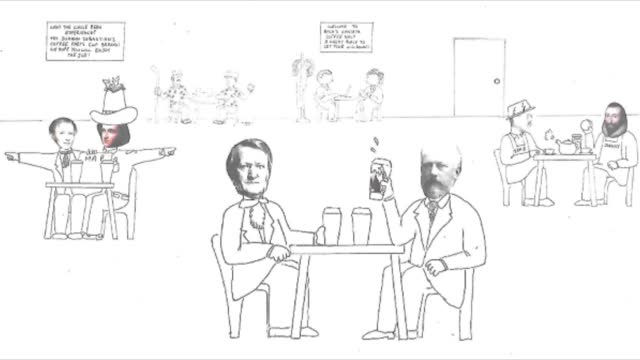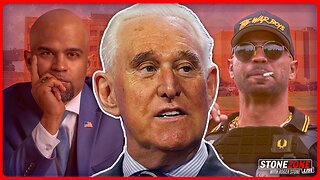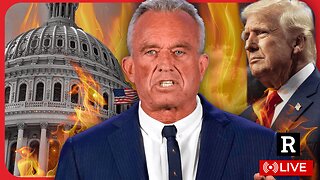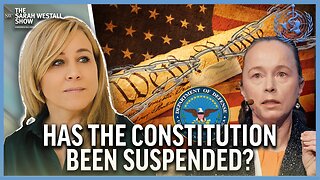Premium Only Content

Bach’s Diversified Portfolio / Spirit of Sechsundsiebzig
“Bach’s Diversified Portfolio” (aka, the extended blackout) is a brief sketch that illustrates the appeal that Johann Sebastian Bach (1685-1750) had and continues to have on just about everyone: from fans of the horror genre (Toccata and Fugue in D Minor), to fans of (Baroque composer Johann Gottlieb) Goldberg (1727-1756), to those who simply wanted something with a beat that they can dance to (his myriad of Minuets, Gavottes and Bourrées) and even to those who just simply want to sit down, relax and have a cup of coffee (his Coffee Cantata). Everyone, that is, with the possible exception of those unfortunate violin students who have to perform Bach’s very difficult partitas for their respective recitals.
The setting for “Spirit of Sechsundsiebzig” is based on fact. Tchaikovsky was actually invited down to Bayreuth, Germany in 1876 to watch the inaugural performance of Richard Wagner’s “Der Ring des Nibelungen (The Ring of the Nibelung, aka, the Ring Cycle). According to Tchaikovsky’s close friend, Russian critic/composer Herman Laroche, Tchaikovsky did not like the Ring, but made it a point to never say it to Wagner’s face…until this sketch, that is.
The dialogue between the barista (Governor Bellingham from the “Hindsight is 1642” sketch) and Rosie (from “The New York Times’ Effect on Man” sketch) pokes fun at the press for their inaccurate reports regarding John F. Kennedy’s “Ich Bin Ein Berliner” speech. From about the mid-1990s until the mid-2000s, several news outlets (including Rosie’s New York Times) printed stories of how John F. Kennedy in his famous June 26, 1963 speech in West Berlin inadvertently said that he was a jelly doughnut (“Berliner” in addition to being the name for a resident of Berlin, is also the name for a type of German jelly doughnut). The misconception appears to have originated from a remark made by Bernard Samson, a highly unreliable intelligence officer, in Len Deighton's 1983 fictional spy novel “Berlin Game,” and somewhere along the line, his remark made the leap from fiction to “fact.” So it appears that the media did indeed “run away with this pastry” in the same vein that The New York Times ran away with the “38 witnesses” story in 1964. Governor Bellingham finally gets Rosie to go away by (very roughly) quoting excerpts from JFK’s nationally televised “Cuban Missile Crisis” speech delivered on October 22, 1962.
It always puzzled us here at CoBaD why Tchaikovsky’s “1812 Overture” is so popular at American Independence Day celebrations when in fact it has nothing to do with America, while Richard Wagner’s wonderful piece, "American Centennial March,” which was specifically written to honor America’s independence, goes largely ignored. Thanks to the “Spirit of Sechsundsiebzig” sketch, we now know why: because Tchaikovsky was an excellent hustler of tunes. Trolling Stone Magazine was quite right to call him to review the Ring, as Tchaikovsky was quite a troller as well; from 1867-1878 he served as a music critic. He loved to rip on fellow classical music composers, especially Johannes Brahms.
Finally, many 1980s pop music enthusiasts will no doubt notice the numerous references to Nena’s 1983 hit “99 Luftballoons.” It is CoBaD’s opinion that Nena is one of Germany’s greatest composers of pieces of less than 15 hours in duration.
-
 1:45:26
1:45:26
Kim Iversen
12 hours agoBANNED for Telling the Truth: The 9/11 and Epstein Plot They Don't Want You To Hear
111K137 -
 1:08:47
1:08:47
Man in America
14 hours agoDr. Makis EXPOSES Big Pharma’s SICK Vaccine Scam—RFK Jr. Must Act NOW!
96.1K25 -
 1:28:21
1:28:21
Glenn Greenwald
12 hours agoRFK Jr. Hearing Reveals DC Pro-Pharma Consensus; Trump's Executive Order to Deport Student Protesters Criticizing Israel; Untangling DC Think Tank Funding & Influence | SYSTEM UPDATE #399
142K167 -
 1:23:44
1:23:44
Space Ice
13 hours agoSpace Ice & Redeye: Van Damme's The Quest: Pirates, Clowns, James Bond & Bloodsport
47.1K3 -
 59:57
59:57
The StoneZONE with Roger Stone
10 hours agoJ6 Martyr Enrique Tarrio Describes Inhumane Prison Conditions Ordered by Biden | The StoneZONE
44.5K4 -
 16:48
16:48
Tundra Tactical
10 hours ago $8.05 earnedAffordable Medical Gear From ACETAC SHOT Show 2025
74.3K3 -
 1:46:16
1:46:16
Redacted News
13 hours agoRFK CONFIRMATION: Kennedy goes to WAR with Big Pharma Democrats in Fiery Hearing | Redacted Live
257K428 -
 57:31
57:31
Candace Show Podcast
13 hours agoBREAKING! Taylor Swift Turns Against Blake Lively & Ryan Reynolds | Candace Ep 141
235K186 -
 1:04:59
1:04:59
Sarah Westall
10 hours agoRFK Jr Report, Constitution Suspended, War Time Procedures in Place, WHO Exit, DOD w/ Sasha Latypova
77.2K34 -
 1:56:37
1:56:37
Melonie Mac
14 hours agoGo Boom Live Ep 35!
67K15